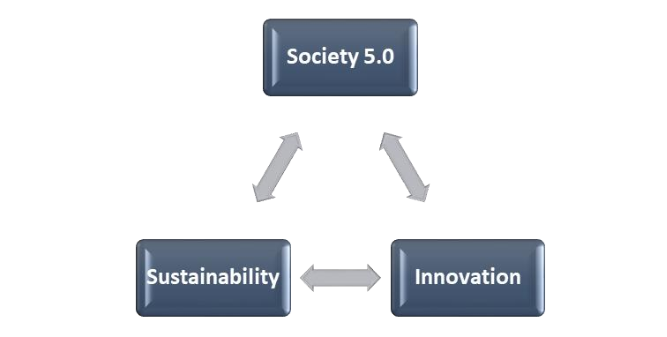
| Version | Summary | Created by | Modification | Content Size | Created at | Operation |
|---|---|---|---|---|---|---|
| 1 | Sandro Serpa | + 798 word(s) | 798 | 2020-04-28 17:43:56 | | | |
| 2 | Catherine Yang | Meta information modification | 798 | 2020-04-29 11:01:59 | | | | |
| 3 | Lily Guo | -172 word(s) | 626 | 2020-10-29 07:32:25 | | | | |
| 4 | Lily Guo | -172 word(s) | 626 | 2020-10-29 07:32:50 | | | | |
| 5 | Lily Guo | Meta information modification | 626 | 2020-10-29 07:34:20 | | |
Video Upload Options
Sustainability digital innovations is an increasingly present element in contemporary societies. This entry is a reflection on sustainability digital innovations within the context of Society 5.0 and the inherent heuristic potentials of this relationship.
1. Introduction
According to Serpa and Ferreira (2019a)[1], digital technology is an increasingly present element in contemporary societies (Society 5.0, focused on the presence of the digital in all social sectors, Ferreira & Serpa, 2018), being relevant in the reconfiguration of the contexts of reference for human action and in shaping the relationships between human and nonhuman actors [2].
These processes of structural transformation, namely those concerning financial markets or the liberalisation of telecommunication markets, have gone global, even though some regions or areas have been participating more actively than others. Underlying many of these large structural transformations, sometimes even causing them, sometimes allowing them to take place, rapid changes have taken place in the area of information and communication technologies at the micro, meso and macro levels[3].
2.Influences
These shifts affect all aspects of society. On the one hand, they are not restricted to the production and distribution of goods and services, although the economic transformation they are causing may be the most visible aspect. On the other hand, they are affecting mainly communication between individuals and between organisations.
As an illustrative example, digital technology potentially involves a diversified look at Goffman’s classic analysis of face-to-face interaction situations, insofar that actors are not physically present.
New technologies, with a significant weight of the digital component, are increasingly present in all spheres of society. There is widespread digitisation of the processing, dissemination and conservation of information in its various modalities, together with the development of coding activities (software), as key activities in the development of economic systems. Furthermore, there is broad access to global information networks, with interactive functioning and multimedia content, fostering innovation processes in terminal equipment, the development of new software and the creation and updating of databases. Digital technological processes are at the basis of the on-going shift in the processes of design and development of products and systems, as well as in educational and entertainment services.
Innovation is critical to the establishment of Society 5.0. Figure 1 depicts the relationships of interdependence between Society 5.0, sustainability and innovation.

To address these challenges, several strategies may provide explanations of digital innovation, without forgetting the complexity of the process of socio-material interaction in digital innovation. Moreover, explanations of digital innovation should be produced based on the specificities underlying digital technology.
Within the framework of Society 5.0, sustainability digital innovations have, thus, the purpose of meeting the challenges posed to the post-humanised societies and increasing the potential of the individual-technology relationship in promoting the improvement of the quality of life of all people through a super-intelligent society – Society 5.0. This is an extremely recent concept as a guiding principle for social development that may have a profound impact on societies at all levels, such as, for instance, quality of life and sustainability[4].
This insight seeks to contribute to the reflection on the relevance of the relationship between Society 5.0 and sustainability digital innovations. Digital social innovation emphasises the intersection of three elements: the innovation process, the social world and the digital ecosystem. The social dimension warns that the focus of innovation is not the technology in itself. On the contrary, it should be seen as a means to address important social challenges.
Note: This Entry is based on Serpa, S., & Ferreira, C. M. (2019). Society 5.0 and sustainability digital innovations: A social process. Journal of Organizational Culture, Communications and Conflicts, 23(1), 1-14. Available at https://www.abacademies.org/articles/Society-5.0-and-Sustainability-Digital-Innovations-A-Social-Process-1939-4691-23-1-129.pdf. For further development, see the references mentioned on it.
References
- Serpa, S., & Ferreira, C. M. (2019a). Society 5.0 and sustainability digital innovations: A social process. Journal of Organizational Culture, Communications and Conflicts, 23(1), 1-14. Available at https://www.abacademies.org/articles/Society-5.0-and-Sustainability-Digital-Innovations-A-Social-Process-1939-4691-23-1-129.pdf
- Serpa, S., & Ferreira, C. M. (2018). Goffman’s backstage revisited: Conceptual relevance in contemporary social interactions. International Journal of Social Science Studies, 6(10), 74. https://doi.org/10.11114/ijsss.v6i10.3659
- Serpa, S., & Ferreira, C. M. (2019b). Micro, meso and macro levels of social analysis. International Journal of Social Science Studies, 7(3), 120. https://doi.org/10.11114/ijsss.v7i3.4223
- Ferreira, C.M., & Serpa, S. (2018). Society 5.0 and social development: Contributions to a discussion. Management and Organizational Studies, 5(4), 26. https://doi.org/10.5430/mos.v5n4p26





